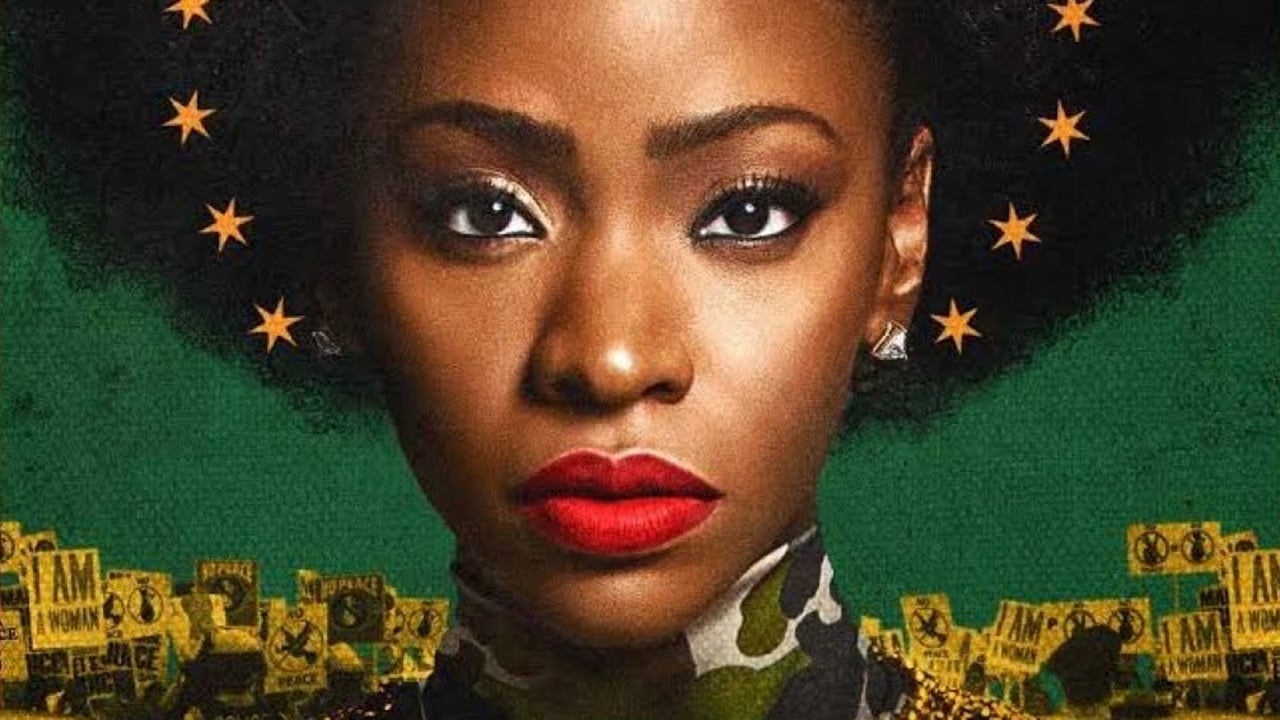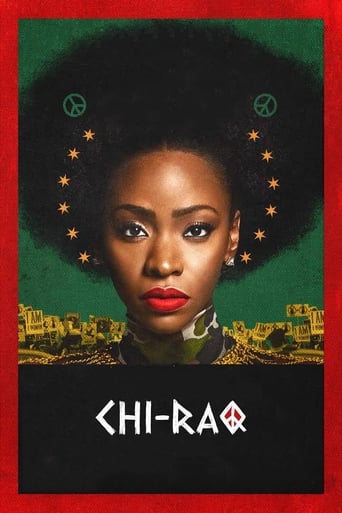

Such a frustrating disappointment
... View Moren my opinion it was a great movie with some interesting elements, even though having some plot holes and the ending probably was just too messy and crammed together, but still fun to watch and not your casual movie that is similar to all other ones.
... View MoreIt's hard to see any effort in the film. There's no comedy to speak of, no real drama and, worst of all.
... View MoreExcellent and certainly provocative... If nothing else, the film is a real conversation starter.
... View MoreI hate this film. An adaptation of Aristophanes play "Lysistrata" set in modern day Chicago, the film sees a bunch of women withholding sex from their boyfriends and husbands until they agree to end the gun violence in Chicago. It's difficult to adapt Greek theater into a modern setting without it seeming silly, since it doesn't lend itself to realistic techniques. Lee fails about as completely as you can, making an overly long, cartoonish film that is oppressively preachy, especially since it has essentially made all of it's key points in the first 15 minutes.
... View MoreI wasn't expecting much from this movie, because Spike Lee films are almost always crudely written, badly directed, and riddled with specious reasoning, shrill self-pity, easy outrage, and many different forms of hypocrisy. All those familiar elements are present in CHI- RAQ in great abundance.But I still give the movie three stars, because the performance of Jennifer Hudson as a young mother who loses her child to gang violence on the streets of Chicago's South Side is genuinely moving. I've never seen a more authentic performance in a Spike Lee film. Jennifer Hudson's pain is so real she almost makes you forget the stilted dialogue, the awkward acting, the clumsy dance routines, and the sexual "humor" that's like a backed-up toilet that explodes in your face for an hour and a half.Jennifer Hudson is amazing, but it's a shame the way fine actors like Samuel Jackson and Wesley Snipes are forced to clown and abase themselves in one lame minstrel show routine after another. All the other females in the movie are demeaned in every scene. Spike parades them half-naked like slaves on the auction block while letting them chant shrill verse about how liberated they are. It's obvious who really dreams about enslaving black women! The violence itself is talked about endlessly, but the anger behind it is never even acknowledged. Instead of dealing with real emotions Spike Lee falls back (not for the first time) on one of the most hateful stereotypes about black people, i.e. that they have over-sized sex drives and under-sized brains. At the end of the film, the main gangster is dragged off to jail in handcuffs, after confessing his crimes. No more violence for him! No more sex, either, but you get the impression that to Spike Lee sex is at least as disgusting as violence. No wonder the only good white person in the movie is a Catholic priest! Oh, and speaking of Catholic priests. John Cusack is unconvincing from start to finish as the "ghetto priest." But there's more to this than bad acting. Spike Lee loves to take cheap shots at America and the flag, but evidently he knows better than to mess with the Catholic Church. He certainly doesn't mention the fact that the Church profited for centuries from the African slave trade. More to the point, he ignores the fact that racism in Chicago has always been worst in Catholic neighborhoods. (These are the people who threw rocks at Martin Luther King in 1968. The priest in the movie doesn't bring that up!)To put the film in perspective: the South Side of Chicago is all black today, but up until 1919 or so it was solidly Irish Catholic. When the blacks tried to move in, the Irish rioted. Dozens of black men, women, and children were killed. Eventually the whites moved out and the South Side became the "black belt" that it is today. What's interesting in the context of the film is that Cusack's character never acknowledges the city's past or the Catholic Church's long-standing indifference to the simmering racial hatred in blue-collar neighborhoods. During the Depression there was a brilliant Irish author from Chicago named James T. Farrell, and he dramatized the self-destructive mixture of racism and Catholicism brilliantly in a novel called STUDS LONIGAN. And guess what? The Catholic Church immediately banned the book. But the wonderful priest in the movie doesn't mention that either! Given the way Spike sneers at black people in this movie (and elsewhere) for not reading books, it's astonishing how ignorant he is of Chicago history and how little effort he makes to research his films. The violence in Chi-Raq is unreal because it's not rooted in history, and because Spike knows better than to challenge the wrong white people.
... View MoreImportant commentary on the reality of the inner city. I didn't care for, and just turned off, the nasty scenes with the sexual crudities and the insulting references to some politicians. Broke my heart to see the more tender scenes of broken hearts and broken lives, because that's the reality for many dear souls. May God help them! May we help them!
... View MoreIf you go back through Spike Lee's career, you'll notice that he averages at least one film a year. That's a pretty prolific and active filmmaker. It's true that Lee has delivered some true cinematic masterpieces - "Do the Right Thing" (1989) and "Malcolm X" (1992), both of which are personal favorites of mine, come to mind - but he's also delivered some misfires; but in my close estimation, he has never made a truly bad movie.Lee's best films usually have a sense of urgency to them, and seem to speak of the cultural mood of the moment; that is why "Do the Right Thing" remains his best film and was released at the right time in 1989 and people are STILL talking about it today. That same sense of urgency and timeliness is what makes his 2015 effort "Chi-Raq" the best film that he's done in years.A problem faced by Lee in his later years was a lack of a focused vision, which is why some of those films in question ran overly long and had taken attention away from the main plots of his films and re-focused on unnecessary sub-plots, which were sometimes far more interesting.That's not the case with his 2015 "Chi-Raq." "Chi-Raq" (a combination of "Chicago" and "Iraq," meaning that Chicago's South Side, particularly its Englewood neighborhood, resembles a war zone, like Afghanistan, or, Iraq) is a comedic stage play that harks back to Lee's earlier "Do the Right Thing," "School Daze" (1988), and his criminally underrated 1995 crime-drama "Clockers" (which is my third favorite film of his). "Chi-Raq" critiques Chicago's alarmingly high murder rate (which peaked in 2015 and according to statistics presented both in the film and media from the time, 55 people were shot over the 2015 Fourth of July weekend, which saw 10 of those shootings as homicides), gun violence, gang culture, black-on-black crime, sexual politics, the Black Lives Matter movement and police brutality in one engaging, 127-minute feature.Essentially a modern-day adaptation of the Classical Greek comedy "Lysistrata" by Aristophanes, the script, co-authored by Lee himself and Kevin Willmott, mixes poetry and rap, which not only adds to its authenticity as one of the more original films to come out last year, but also brings the culture of the Chicago inner-city to the cinematic forefront. Using the gun violence that the city saw in 2015 as a launch-pad - and with poetic narration by Dolmedes (Samuel L. Jackson) - "Chi-Raq" surrounds Lysistrata (Teyonah Harris), the girlfriend of Spartan gang leader and aspiring rapper Demetrius "Chi-Raq" Dupree (Nick Cannon).After the seven-year-old daughter of a local neighborhood woman named Irene (Jennifer Hudson) is killed by a stray bullet in the city's latest gang shooting, Lysistrata, inspired by the 2003 Leymah Gbowee-led sex strike that ended the second civil war in Liberia and with further encouragement by Miss Helen (Angela Bassett) and street-wise local priest Father Mike (John Cusack, who preaches an inspiring sermon at a church), organizes a sex strike of her own - the women of the city will withhold sex from their men until all violence in the city ceases. This causes problems for the men of Chicago, not just Chi-Raq, but also his rival, one-eyed Trojan leader Cyclops (Wesley Snipes). Even the mayor, Mayor McCloud (D.B. Sweeney), feels the sting of forced-chastity when his biracial wife refuses to put out!"Chi-Raq" is one of Spike Lee's greatest movies because of its potent sense of urgency and timeliness. There's no question that the alarmingly high murder rate last year - and the police-involved deaths of young black men and boys such as Michael Brown, Freddie Gray, Eric Garner, Tamir Rice, and Walter Scott over the last few years (and who are all name-dropped at one point in the film) - inspired Lee to put "Chi-Raq" together. But he had fun with the story. It's a comedy and a satire, and it's all quite funny, but like all good satire, it draws much-needed attention to a problem that gets a lot of negative reporting in the media, but nothing gets done about - due to indifference from politicians and the general public alike, and the idolizing of self-destructive behavior by those in the communities affected by all this.Like Lee's "Do the Right Thing," which people accused of not offering any real solutions to the problem of racism (and people even accused of inciting racial violence that would ultimately never happen), "Chi-Raq" doesn't offer any real solutions to the problems faced by Chicago's gun violence epidemic. Instead, it presents a satirical fantasy scenario where chastity results in world peace. Who knows? Maybe a sex strike could lead to peace in Chicago? I really have no idea, but hopefully someone sees the movie and is inspired..."Chi-Raq," like a number of truly great and deserving films over the years, was also grossly overlooked by the Academy this year. It goes to show the increasing loss of integrity that the Academy has sustained over the years. But I hope that in the coming years, "Chi-Raq" gets more attention and becomes regarded as one of the most important films of our time and one of Spike Lee's finest achievements.But let's remember: "No Peace, No Piece!"9/10
... View More